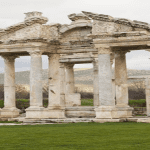
Immanuel Kant thought religion’s sole value lay in its capacity to provide a moral framework. While Catholicism must reject such a reductionist view, it cannot be denied that morality certainly plays a significant role in biblical religion.
In this paper, I will examine the various aspects of Catholic moral theology. First, however, I will address what moral theology means.
Moral theology refers to the study of human actions directed by reason and faith toward the attainment of a supernatural destiny. This concept is clarified when it is compared to ethics. Moral theology generally differs from ethics in that it is predicated on Divine grace and revelation, which illuminates the intellect. On the other hand, ethics is limited to knowledge of right and wrong as understood by reason alone. Where moral theology is concerned with the ultimate state of the soul, ethics is concerned with conduct among people.
Owing to this, a code of ethics can be divorced from objective morality. An example can be derived from the legal profession. An attorney may act morally by informing the police about his client’s actions. However, such conduct would violate the ethical practice of lawyers.
Moreover, moral theology is predicated on the belief that human beings are not just social animals that must “get along” but creatures made in the very image of God. To paraphrase Saint Augustine, we are created by God for God.
Before proceeding to the four components of moral theology, I want to briefly touch on the three elements that make up a moral (or immoral) act. These elements can be defined as the objective act (what we do), the subjective intention (why we do the act), and the circumstances in which we perform the act (where, when, how, with whom, the consequences, etc.).
For an individual act to be morally good, the object, or what we are doing, must be objectively good. Apart from the intention or reason for doing some acts, some actions are always wrong because they go against a fundamental or basic human good that should never be compromised. Murder and rape are examples of acts that are always wrong. Such acts are referred to as intrinsically evil acts; that is, they are wrong in themselves, apart from the reason they are done or the circumstances surrounding them.
I now turn to Catholic moral theology’s four components: freedom, truth, law, and conscience.
The existence of a moral agent presupposes freedom. That is to say, freedom is a necessary condition for any moral act. To understand why, we must clearly understand what freedom means.
Within the human context, freedom can take various forms. A fundamental definition of freedom is the capacity of an agent to act or not act free from external constraints. This is freedom from coercion, which is the capacity to carry out what one has decided upon without impediments from outside agents. Examples of this are freedom of expression and freedom of organization.
Freedom of choice or psychological freedom connotes the absence of the internal need to choose one thing or another. This refers to the freedom to decide autonomously without being bound by an interior determinism. Finally, moral freedom refers to the capacity to affirm and love the good, which is the object of one’s free will, without being enslaved by disordered passions or sin.
“What is truth?” Pontius Pilate famously asks in John’s Gospel. The modern phraseology of “my truth” echoes Pilate’s skepticism. The issue of truth necessarily provides the foundation for morality. Moreover, morality must be predicated upon the existence of an objective standard if it is to have any meaning. If there is no objective truth, there can be no judgment about right and wrong that rises above the tyranny of the masses.
The answer to Pilate’s question, “What is truth?” is the conforming of the mind to reality. In moral theology, truth means the mind corresponding to natural law, which is a manifestation of the mind of God.
The natural law is innate in beings endowed with reason and inclines them toward their right action and end. It consists in the light of reason that enables man to discern good from evil. It is called “natural” because it consists of the light of reason that each person has by nature.
Natural law segways directly into conscience. For Cardinal John Henry Newman, conscience represented the aboriginal vicar of Christ in the soul. (Newman, John Henry. A Letter Addressed to His Grace the Duke of Norfolk. 1875).
A properly formed conscience makes clear our moral obligation in the light of the natural law. In this sense, the conscience signals to the individual the good he is to do and the evil he is to avoid. The phrase “properly formed” is worthy of explanation. Because we have fallen natures, we can be subjectively wrong about something objectively true. I can think subjectively that the earth is flat while it is objectively a sphere. For this reason, Catholicism insists that individuals follow the authoritative teaching of the Church in conjunction with the teachings of the Holy Spirit to form their conscience.
In conclusion, I want to address why all of this matters. Two reasons are readily apparent. First, an objective morality provides the touchstone for human laws. Without an objective standard, human laws are simply the dictates of those in power. An example of this can be drawn from Nazism. The holocaust took place under the color of German law. Yet any rational person would admit the holocaust was an affront to natural law and objective morality. For this reason, it is possible to speak of man-made laws (positive laws) as being just and unjust. The criteria for determining whether a law is just or not is whether the man-made law is congruent with natural law.
The second reason is teleological. Human beings, by nature, seek happiness. The ultimate happiness, the summon bonum of human existence, is communion with God. This communion with God requires holiness, and holiness is predicated upon adhering to moral principles. If we wish to be happy, we must be virtuous.
In this essay, I have sought to provide the framework for understanding Catholic moral theology. I have examined the three elements that make an act moral or immoral. Finally, I have delineated the four components of Catholic moral theology.













